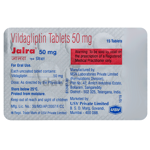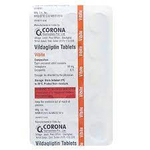
vildagard (VILDAGLIPTIN)
Introduction to Vildagard
Vildagard is an oral medication primarily used for managing type 2 diabetes. It belongs to a class of drugs known as dipeptidyl peptidase-4 (DPP-4) inhibitors. By enhancing th... See More

What is Vildagard?
Vildagard is a medication used to treat type 2 diabetes. It belongs to a class of drugs called DPP-4 inhibitors, which help control blood sugar levels by increasing the levels of incretin hormones. These hormones help regulate insulin and glucagon, which are hormones that control blood sugar. Vildagard is often used in combination with other diabetes medications to enhance its effectiveness.

What is the usual dose of Vildagard?
The usual starting dose of Vildagard for adults is 50 mg once or twice daily. Your doctor may adjust your dose based on your blood sugar control and how well you tolerate the medication. The maximum recommended dose is 100 mg per day. Always follow your doctor's specific dosing instructions for your personal health needs.

How do I take Vildagard?
Take Vildagard as prescribed by your doctor, usually once or twice daily. You can take it with or without food. Do not crush or chew the tablets. If you miss a dose, take it as soon as you remember unless it's almost time for your next dose. In that case, skip the missed dose and continue your regular schedule. Do not take two doses at once. Always follow your doctor's specific advice about diet and fluid intake while taking this medication.

For how long do I take Vildagard?
Vildagard is usually a long-term medication for managing type 2 diabetes. You'll typically take Vildagard every day as a lifelong treatment unless your doctor suggests otherwise. Stopping this medication without medical advice could cause your condition to worsen. How long you'll need this medication depends on your body's response, any side effects you experience, and changes in your overall health.

What disease or symptom is Vildagard used for?
Vildagard is used to treat type 2 diabetes. It helps lower blood sugar levels by increasing the levels of incretin hormones, which help regulate insulin and glucagon. Vildagard is often used in combination with other diabetes medications to enhance its effectiveness. It is not used for type 1 diabetes or diabetic ketoacidosis, which is a dangerous buildup of acids in your blood.

How long does it take for Vildagard to start working?
Vildagard begins working in your body shortly after you take it. You might see some improvement in blood sugar levels within days, but more significant changes typically take several weeks. How quickly the medication works can depend on your overall health and how well you follow your treatment plan. Take it exactly as prescribed for the best results.

Is Vildagard effective?
Vildagard is effective for managing type 2 diabetes. It works by increasing the levels of incretin hormones, which help control blood sugar levels. Clinical studies show Vildagard improves blood sugar control in diabetes patients. It is often used in combination with other diabetes medications to enhance its effectiveness. Always follow your doctor's advice for the best results.

How do I know if Vildagard is working?
Vildagard is used to treat type 2 diabetes. You'll know it's working when your blood sugar levels improve, as shown by your HbA1c blood test. You might also notice less thirst and fewer bathroom trips. Regular check-ups with your doctor are important to see if the medication is working properly for your condition. Your doctor may adjust your treatment based on these test results and how you're feeling.

How does Vildagard work?
Vildagard works by inhibiting the DPP-4 enzyme, which breaks down incretin hormones. These hormones help regulate insulin and glucagon, which are hormones that control blood sugar. By blocking DPP-4, Vildagard increases incretin levels, improving blood sugar control. Think of it like a thermostat that helps maintain the right temperature, keeping your blood sugar levels balanced.

Who should avoid taking Vildagard?
Don't take Vildagard if you're allergic to it or its ingredients. Serious allergic reactions, which cause rash, hives, or swelling that makes breathing difficult, require immediate medical help. Vildagard shouldn't be used by people with severe liver problems, as it might worsen liver function. Always consult your doctor about these concerns.

Can I take Vildagard with other prescription drugs?
Vildagard can interact with other diabetes medications, increasing the risk of low blood sugar, which is called hypoglycemia. It may also interact with medications that affect liver function. Always inform your doctor about all the medications you are taking to avoid potential interactions. Your doctor can help manage your medications to minimize risks and ensure effective treatment.

Can Vildagard be taken safely while pregnant?
Vildagard isn't recommended during pregnancy due to limited evidence on its safety. Uncontrolled diabetes during pregnancy can cause serious problems for both mother and baby. If you're pregnant or planning to become pregnant, talk with your doctor about the safest way to manage your blood sugar. Your doctor can help create a pregnancy-specific treatment plan that protects both you and your baby.

Can Vildagard be taken safely while breastfeeding?
Vildagard is not recommended while breastfeeding due to limited information on whether it passes into human breast milk. While we don't have specific reports of harm to breastfed babies from Vildagard, we can't rule out potential risks. If you're taking Vildagard and want to breastfeed, talk with your doctor about safer medication options that would allow you to nurse your baby safely.

Is Vildagard safe for the elderly?
Elderly individuals are more vulnerable to safety risks of medications due to age-related changes in the body. Vildagard is generally safe for the elderly, but they may be at higher risk for side effects like dizziness. Regular monitoring and dose adjustments may be necessary. Always consult your doctor about the specific risks and benefits of Vildagard for elderly patients.

How should I store Vildagard?
Store Vildagard at room temperature, away from moisture and light. Keep it in a tightly closed container. Don't store it in humid places like bathrooms, where moisture in the air could affect how well the medication works. Always store Vildagard out of children's reach to prevent accidental swallowing. Check the expiration date regularly and properly dispose of any unused or expired medication.

Does Vildagard make people tired or drowsy?
Sleepiness and drowsiness aren't common side effects of Vildagard. Most people take this medication without feeling unusually tired. If you notice you're feeling very sleepy or fatigued while taking Vildagard, talk with your doctor. Your tiredness might be caused by something else, like another medication you're taking, or an underlying health condition. Proper rest, regular physical activity, and a balanced diet can help maintain your energy levels.

Does Vildagard cause stomach upset?
Vildagard can occasionally cause stomach upset, including nausea and diarrhea. These side effects are usually mild. Taking the medication with food might help reduce discomfort. If you develop severe or persistent stomach issues, talk with your doctor. Always let your healthcare provider know about any new or worsening symptoms you experience while taking this medication.

Does Vildagard affect sleep?
Vildagard doesn't typically cause sleep problems. Most people take this medication without experiencing any changes in their sleep patterns. If you notice changes in how well you sleep after starting this medication, talk with your doctor. Sleep problems might be related to something else, like another medication you're taking or a different health condition. Your doctor can help figure out what's causing your sleep issues.

Does Vildagard make it hard to think or concentrate?
Vildagard doesn't typically cause thinking problems or concentration difficulties. Most people take this medication without experiencing any changes in their mental focus or memory. If you notice problems with your thinking after starting this medication, talk with your doctor. These symptoms might be related to something else, such as low blood sugar, which is when your blood glucose drops too low, or another health condition.

Does Vildagard affect mood?
Vildagard doesn't typically cause mental health effects. Most people take this medication without experiencing mood changes, anxiety, or feelings of agitation. If you notice changes in your mood or mental well-being after starting this medication, talk with your doctor. These symptoms might be related to something else, like stress or another health condition, rather than the medication itself.

Does Vildagard interfere with sexual function?
Vildagard doesn't typically cause sexual side effects like erectile dysfunction or loss of libido. Most people take this medication without noticing changes in their sexual function. However, if you experience any persistent discomfort or changes in your sexual function while taking Vildagard, talk with your doctor. Your doctor can help determine if your symptoms are related to the medication and recommend appropriate treatment to address any issues while continuing your diabetes care.

Does Vildagard affect appetite?
Vildagard doesn't typically affect your appetite. Most people taking this medication don't notice changes in how hungry they feel or how much they want to eat. If you notice any unexpected changes in your appetite after starting Vildagard, talk with your doctor about these changes. For mild appetite changes, try maintaining regular meal times and eating a balanced diet while taking your medication.

Does Vildagard cause weight gain?
Vildagard doesn't typically cause significant weight changes. Most people taking this medication don't notice changes in their weight. If you notice any unexpected changes in your weight after starting Vildagard, talk with your doctor about these changes. Your doctor can help determine if any weight changes you experience are related to Vildagard or if there might be another cause.

Does Vildagard cause headaches?
Headaches are not a common side effect of Vildagard. Most people take this medication without experiencing any head pain. If you do get mild headaches while taking Vildagard, staying well-hydrated and resting may help. You can also take over-the-counter pain relievers after checking with your doctor. For severe or persistent headaches, talk with your healthcare provider.

Does Vildagard limit driving?
Vildagard might affect your ability to drive safely in some cases. This medication can sometimes cause dizziness or light-headedness. If you feel dizzy or faint after taking Vildagard, avoid driving until these symptoms go away. When you first start this medication, pay attention to how your body responds before getting behind the wheel. Talk with your doctor about any concerns you have about driving while taking this medication.

Is it safe to drink alcohol while taking Vildagard?
It's best to avoid alcohol while taking Vildagard. Drinking alcohol can increase your risk of low blood sugar, which is called hypoglycemia. This condition can cause dizziness, confusion, or even fainting. If you do choose to drink occasionally, limit how much alcohol you consume and watch for warning signs like dizziness or confusion. Talk with your doctor about alcohol use while taking Vildagard to get personalized advice.

Is it safe to drink coffee or tea while taking Vildagard?
You can drink coffee and tea while taking Vildagard. There's no known interaction between caffeine and Vildagard. However, caffeine can increase urination, so drinking too many caffeinated beverages might increase your risk of dehydration, which is when your body doesn't have enough fluids. Try to enjoy caffeinated drinks in moderation and make sure you drink plenty of water throughout the day.

Is it safe to exercise while taking Vildagard?
You can exercise while taking Vildagard, but keep a few things in mind. This medication can lower your blood sugar, which is called hypoglycemia, particularly if you take insulin or certain other diabetes medications. Low blood sugar might make you feel weak during workouts. To exercise safely, drink plenty of water before, during, and after physical activity. Watch for signs of dizziness, unusual fatigue, or low blood sugar.

What are Vildagard possible harms and risks?
Common side effects include headache, dizziness, and nausea. Rare but serious side effects include liver damage and allergic reactions. If you notice signs like yellowing of skin or severe skin reactions, contact your doctor immediately.
Available in 2 variations

Vildagard 50mg Tablet 15s
Vildagliptin (50mg)
strip of 15 tablets

Vildagard OD 100mg Tablet 15s
Vildagliptin (100mg)
strip of 15 tablets














.svg)
